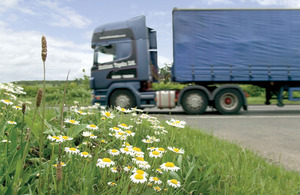Driving standards for lorry and bus drivers
New frameworks setting out the competences expected of lorry, bus and coach drivers have been published today (24 September 2012).

Lorry on a road
The frameworks define the skills, knowledge and understanding required to drive these vehicles safely and responsibly.
The Driving Standards Agency (DSA) has worked with the haulage and passenger transport industries to develop these and they address specific issues such as the use of tachographs and the dangers of continuous driving.
The ‘National driving standard category C™ (lorry)’ and the ‘National driving standard category D™ (bus and coach)’ outline what drivers need to know, understand and be able to do in areas such as:
- preparing a vehicle and its occupants for a journey
- guiding and controlling a vehicle
- using the road in accordance with the Highway Code
- driving safely and responsibly in the traffic system
- reviewing and adjusting driver behaviour over a lifetime
DSA Chief Executive, Rosemary Thew, said:
The haulage and passenger transport industries are a vital part of Britain’s economy and have an important role to play in keeping our roads among the safest in the world.
The publication of these standards will help to ensure that all bus and lorry drivers acquire the right skills, knowledge and attitude to use our roads safely and responsibly, as well as contributing to cutting the human and financial cost of road accidents.
I want to thank the haulage and passenger transport industries and the sector skills councils for their input into the development of the standards. These will enhance the excellent training that is already available and contribute to the work DSA is doing to set standards for everyone who uses a motorised vehicle on the public roads.
Training industry encouraged to create courses
The standards should form the basis of training that a lorry, bus or coach driver receives – and so the training industry is encouraged to create courses that address them. This includes both the training that drivers complete to professionally (Driver CPC) and training for those who don’t drive for a living.
The standards build on the ‘National driving standard category B™’ that defines safe and responsible driving for car and light van drivers. They are based on evidence, open to challenge and regularly reviewed to ensure they are relevant and up to date.
The publication of the standards fulfils the commitment made in the government’s ‘Strategic framework for road safety’ to extend the standards framework to cover categories C and D.